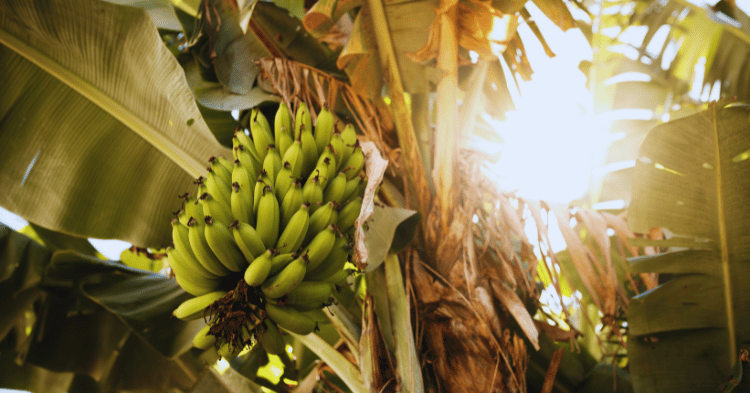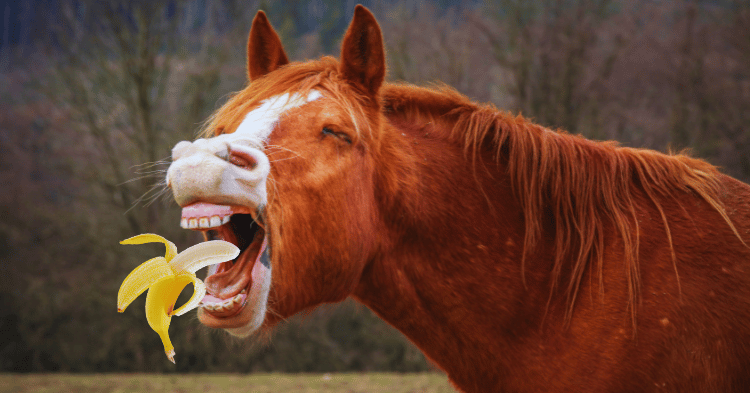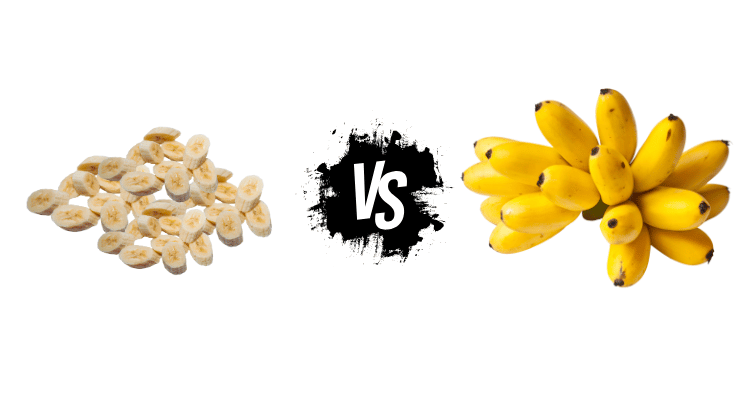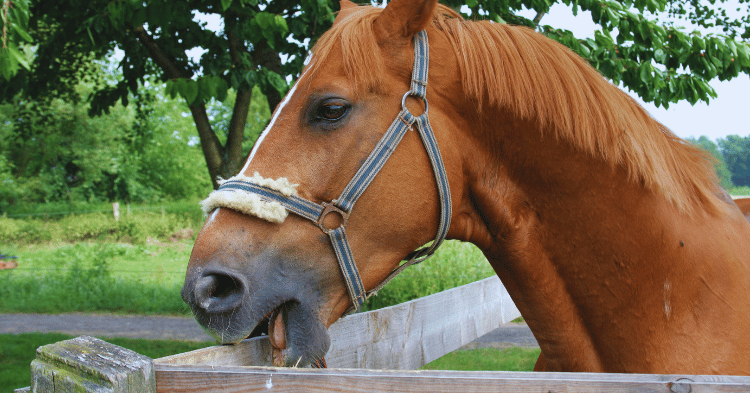Picture this: your curious horse eyes a bright yellow banana in your hand, sniffing it with undeniable intrigue. You hesitate, unsure if this sweet treat is a safe option or a potential health hazard. Feeding horses unfamiliar foods can be a gamble.
Their delicate digestive systems and specific nutritional needs make them more susceptible to adverse reactions than other animals. Offering a seemingly harmless snack without understanding its impact could lead to discomfort or even serious issues. So, can horses eat bananas without worry?
The answer lies in understanding their unique dietary requirements. Bananas, with their natural sugars and potassium-packed goodness, might seem like a delightful choice. But are they truly beneficial, or could they upset your equine companion’s health?
This guide will unravel the truth, providing safe feeding practices to ensure your horse enjoys a treat without compromising its wellbeing. Let’s explore how to balance indulgence with safety.
Understanding Horses and Bananas

Benefits of Bananas for Horses
Bananas can be a nutritious treat for horses when fed in moderation. They are a source of essential vitamins and minerals, making them a beneficial addition to a horse’s diet. Here are some key benefits:
- Potassium: Bananas are high in potassium, which helps regulate nerve and muscle activity in horses. This can be particularly useful for balancing electrolyte levels after exercise.
- Vitamins: Bananas contain vitamins such as vitamin C, vitamin D, and vitamin B6. Vitamin C works as an antioxidant, while vitamin B6 aids in protein metabolism.
- Magnesium: This mineral is present in bananas and can help maintain normal muscle and nerve function.
- Fiber: Dietary fiber in bananas can aid digestion and promote gut health.
It is important to chop bananas into small pieces for easier consumption and to avoid choking hazards. It’s also crucial to limit the intake to a few bananas per week to prevent over-consumption of sugars and other nutrients.
| Nutrient | Amount per Banana (118g) |
|---|---|
| Potassium | 422 mg |
| Vitamin C | 10.3 mg |
| Vitamin B6 | 0.5 mg |
| Magnesium | 31.9 mg |
Risks of Feeding Bananas to Horses

While bananas are beneficial in many ways, there are also risks involved in feeding them to horses, particularly if not done correctly:
- Sugar Content: Bananas are high in sugar, which can cause gastrointestinal issues in horses. This is especially problematic for horses with Equine Metabolic Syndrome or Cushing’s disease, who require low-sugar diets (PetMD).
- Choking Hazard: Feeding whole bananas can pose a choking risk. It is safer to chop bananas into smaller chunks or mash them before feeding.
- Metabolic Issues: For horses with specific health conditions, such as metabolic disorders or muscle disorders, the high sugar and carbohydrate content in bananas can exacerbate symptoms and should be avoided.
For those interested in exploring other treat options for their horses, our articles on can horses eat grapes and can horses eat watermelon offer additional healthy alternatives.
By assessing both the benefits and risks, horse owners can make informed decisions about including bananas as part of their horse’s diet.
Moderation and Preparation
Introducing bananas into your horse’s diet can be beneficial when done in moderation and with proper preparation. Here, we outline the recommended feeding guidelines and the best ways to prepare bananas for your equine friend.
Recommended Feeding Guidelines
Feeding bananas to horses should always be done sparingly. It’s crucial to limit the quantity to avoid potential digestive and health issues.
| Quantity | Recommendation |
|---|---|
| Per serving | 1-2 bananas |
| Weekly limit | 3-4 bananas |
These limitations help to prevent digestive issues, sugar spikes, and high insulin levels, which are especially important for horses with pre-existing health conditions.
Benefits of Moderation:
- Aids digestion
- Provides a source of energy
- Helps with minor gastrointestinal problems (Horse and Hound)
Remember, while bananas can be a tasty treat, they should not replace the regular diet of forage that your horse is accustomed to. Bananas should be an occasional supplement, not a staple.
For horses that require a low-sugar diet due to conditions like Equine Metabolic Syndrome or Cushing’s Disease, bananas should be avoided to prevent complications (PetMD).
Chopping vs. Feeding Whole

The preparation of bananas is also an important consideration for horse safety. Feeding whole bananas can present a choking hazard.
Chopping Bananas:
- Chop bananas into smaller chunks
- Mash the bananas before feeding
These methods reduce the risk of choking, making it easier and safer for horses to consume bananas.
Advantages of Chopping or Mashing:
- Reduces choking risk
- Easier for horses to chew
- Suitable for mixing with other feeds
By adhering to these guidelines, you can ensure that your horse enjoys bananas as a safe and healthy treat.
Learn more about other safe treats and feeding practices in our articles on can horses eat apples, can horses eat watermelon, and can horses eat pears.
Nutritional Impact
Potassium and Vitamin Content
Bananas are a rich and beneficial source of various nutrients that can be advantageous for horses. They are particularly high in potassium, which plays a crucial role in balancing electrolyte levels and regulating nerve and muscle activity in horses.
Bananas also contain significant amounts of Vitamin C, dietary fiber, and Vitamin B6. These vitamins and minerals contribute to the overall health and well-being of horses, making bananas a suitable treat when offered in moderation.
| Nutrient | Amount per 100g of Banana |
|---|---|
| Potassium | 358 mg |
| Vitamin C | 8.7 mg |
| Dietary Fiber | 2.6 g |
| Vitamin B6 | 0.4 mg |
For recommended serving sizes, feeding one or two bananas at a time is suggested, no more than three to four times a week. This ensures that horses receive the nutritional benefits without risk of excess intake.
Impact on Digestion and Energy Levels
Bananas can positively impact a horse’s digestion and energy levels. The dietary fiber found in bananas aids in digestion and can help with minor gastrointestinal problems (Horse & Hound). The natural sugars in bananas provide a quick energy source, making them a beneficial treat before or after exercise.
It’s essential to note the high sugar content in bananas. While this can offer an energy boost, excessive sugar intake can lead to gastrointestinal issues. Therefore, feeding bananas in moderation is necessary. Cutting bananas into small pieces can facilitate easier consumption and prevent choking (Quora).
To learn more about other fruits that are safe for horses, check out our article on can horses eat watermelon or can horses eat apples. For advice on how to manage a horse’s diet more effectively, visit our guidelines on can horses eat celery and can horses eat pears.
Considerations for Specific Health Conditions

When considering whether horses can eat bananas, it’s crucial to account for any specific health conditions. While bananas have certain nutritional benefits, they can pose risks for horses with certain metabolic and muscle disorders.
Effects on Horses with Metabolic Issues
Horses suffering from metabolic disorders such as Equine Metabolic Syndrome (EMS) or Cushing’s disease require a diet low in sugar to manage their condition. Bananas, though favored by many horses due to their sweet taste, contain high fructose levels.
| Nutrient | Content per Banana (118g) |
|---|---|
| Sugar | 12g |
| Fructose | 6g |
Given the sugar content, feeding bananas to horses with EMS or Cushing’s disease should be avoided. The high sugar content in bananas can exacerbate the symptoms of these conditions, leading to issues like insulin resistance and laminitis. Horses diagnosed with these metabolic issues benefit from a diet composed primarily of low-sugar forages and specially formulated feeds. Explore our feeding guidelines for detailed insights.
Risk for Horses with Muscle Disorders
Another critical consideration is for horses with hyperkalemic periodic paralysis (HYPP), a genetic condition that makes horses vulnerable to potassium-induced muscle spasms and trembling. Bananas are rich in potassium, which can trigger symptoms in horses with HYPP.
| Nutrient | Content per Banana (118g) |
|---|---|
| Potassium | 422mg |
For horses with HYPP, dietary potassium should be carefully monitored and managed. High-potassium foods, including bananas, are likely to cause health complications. It’s recommended that owners of HYPP-affected horses avoid feeding bananas entirely to minimize the risk of adverse reactions. To learn more about maintaining a balanced diet for horses with muscle disorders, visit our section on can horse sweat.
Horses, just like any other pets, require careful dietary consideration to maintain their health. While bananas can be a delightful treat for some, it’s imperative to ensure they are suitable for the individual health needs of each horse. Always consult with a veterinarian before introducing new foods into your horse’s diet, especially if they have known health conditions. For further reading on safe fruit options for horses, check out our articles on can horses eat pears and can horses eat apples.

